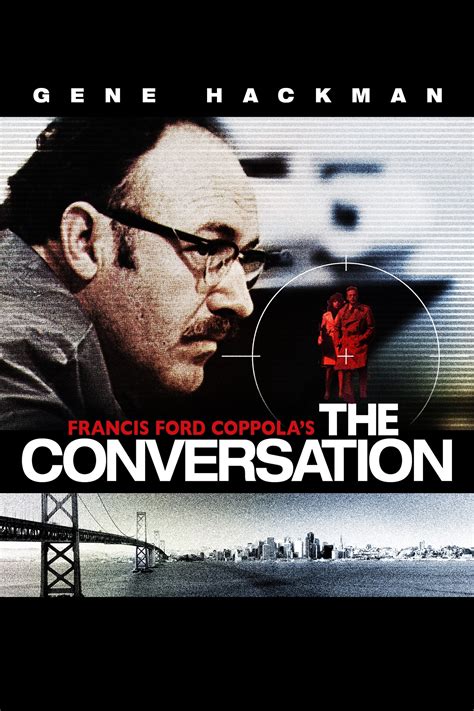The Conversation
directed by: Francis Ford Coppola, year: 1974
actors: Gene Hackman, John Cazale, Allen Garfield, Cindy Williams
actors: Gene Hackman, John Cazale, Allen Garfield, Cindy Williams

Description:
The Conversation is a 1974 mystery thriller that follows Harry Caul, a surveillance expert, as he becomes consumed by paranoia and moral dilemmas. Hired to record a seemingly mundane conversation between a young couple, Caul becomes increasingly obsessed with the implications of the dialogue he captures. As he delves deeper, his professional detachment erodes, exposing vulnerabilities and ethical conflicts. The film explores themes of privacy, obsession, and the impact of technology on human relationships.Keywords:
Surveillance, Paranoia, Isolation, Privacy, ObsessionWhat is the point of the movie The Conversation?
"The Conversation," directed by Francis Ford Coppola, explores themes of surveillance, privacy, and the moral implications of technology. The film follows Harry Caul, a skilled audio surveillance expert, who becomes entangled in the lives of those he is spying on. As he grapples with the ethical consequences of his work, the narrative raises questions about the nature of truth, the impact of eavesdropping on human relationships, and the isolation that comes from living in a world where privacy is increasingly compromised. Ultimately, it examines the burdens of knowledge and the cost of obsession.
Is The Conversation worth watching?
Yes, "The Conversation," directed by Francis Ford Coppola, is definitely worth watching. Released in 1974, this psychological thriller explores themes of surveillance, privacy, and moral ambiguity through the story of a skilled wiretap expert, played by Gene Hackman. The film is acclaimed for its suspenseful narrative, strong performances, and thought-provoking commentary on technology and ethics. Its masterful direction and haunting score contribute to an engaging viewing experience, making it a classic that remains relevant today.
Is the movie The Conversation based on a true story?
"The Conversation" is not based on a true story but rather an original screenplay written by Francis Ford Coppola. Released in 1974, the film explores themes of surveillance, privacy, and moral dilemmas through the character of Harry Caul, a professional eavesdropper. While the storyline is fictional, it reflects real concerns of the time regarding technology and personal privacy, which remain relevant today. Coppola was influenced by various societal issues, but the narrative itself is entirely a product of his imagination.
Did Gene Hackman play the saxophone in The Conversation?
In "The Conversation," Gene Hackman’s character, Harry Caul, does not play the saxophone. Instead, he is a surveillance expert who specializes in recording conversations. While music is an important element in the film, particularly in setting the mood and enhancing the themes of privacy and surveillance, Hackman's character is not depicted as a musician. The film, directed by Francis Ford Coppola, explores the ethical implications of surveillance and the impact it has on personal lives.
Explore More Categories: